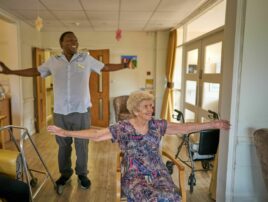
Monday 9th November 2020
The ‘cold-shock’ protein that could lead to a cure for dementia
Louise Morse
RESEARCHERS AT CAMBRIDGE UNIVERSITY HAVE DISCOVERED A PROTEIN IN THE BLOOD OF REGULAR WINTER SWIMMERS THAT COULD LEAD TO NEW DRUG TREATMENTS TO HOLD DEMENTIA AT BAY.
The protein, RBM3, restores broken brain cell connections that are lost in the early stages of Alzheimer’s and other neuro-degenerative diseases.
The Cambridge dementia team, led by Professor Giovanna Mallucci, has been examining RBM3 since 2015, and these findings follow three years of research with humans. Professor Giovanna Mallucci had been intrigued by the ability of hibernating animals’ brains to ‘miraculously reform’ their broken brain connections when they wake up in the Spring that are lost during hibernation to conserve energy; a loss of 20 – 30%. If broken connections could be restored in Alzheimer’s disease it would offer hope to thousands all over the world.
The ‘cold-shock’ chemicals were discovered by the Cambridge dementia team in 2015, when they produced hypothermia (below 35 0) in mice with Alzheimer’s disease and prion (neurodegenerative) disease, and normal mice. When the mice were rewarmed, they found that the brains of the ordinary mice regenerated their synapses, but the Alzheimer’s and prion mice did not. They also found that levels of RBM3 soared in the ordinary mice but not the others, suggesting that the protein could be the key to the formation of new connections.
A separate experiment showed that Alzheimer’s and prion disease could be prevented by artificially boosting RBM3 levels in mice.
The next step was to test for RBM3 in the human population. In an interview on ‘Today’ (BBC Radio 4) Professor Mallucci explained that her team would like to look for it in humans, but it would be difficult because of the ethical considerations of inducing hypothermia. Her interview was heard by Martin Pate, one of a small group who swim throughout the winter at the unheated open-air lido on London’s Hampstead Heath. He sent her an email, saying that they regularly made themselves hypothermic, and would be ideal subjects for a study. So, during the following three winters Professor Mallucci’s team looked for the protein in the winter swimmers, using as a control group members of a Tai Chi club who practised beside the pool but never swam in it. None of the exercise group on the poolside experienced low body temperatures or an increase in RBM3, whereas the swimmers all became hypothermic with core temperatures as low as 34C and with a significant number having markedly elevated levels of RBM3.
Other researchers report finding similarly higher levels of RBM3 in babies and heart and stroke patients who were made hypothermic. Professor Mallucci says that the findings show that, just like hibernating mammals, humans produce the ‘cold-shock’ protein RBM3. The challenge now is to find a drug that stimulates its production in humans, and to prove that it really does help delay dementia.
It’s been known for some time that swimming in cold water can lift depression, although the mechanism has not been explained, apart from the theory that in coping with the stress of exposure to the cold shock the body which then develops resistance to other stressors. It is known that chronic depression slows blood flow to the brain and can mimic the symptoms of dementia.


































